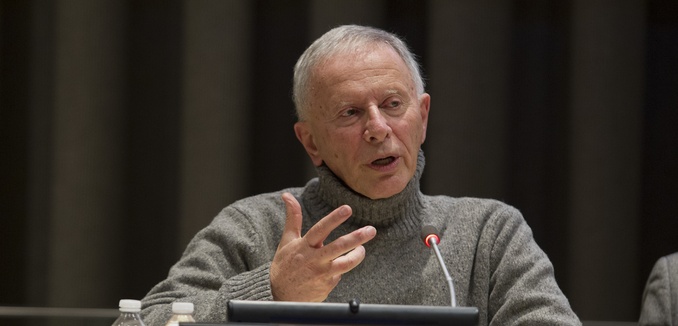It was with deep sadness that I learned last night of the passing of my dear friend and teacher, Professor Robert Wistrich, at the age of 70.
Robert was the world’s foremost scholar of anti-Semitism. Based at the Hebrew University of Jerusalem, where he headed the Vidal Sassoon International Center for the Study of Antisemitism, Robert was a prolific author and speaker, whose encyclopedic knowledge and unrivaled insight into the persistence of anti-Semitism was sought by academics, journalists, and politicians alike.
The news of Robert’s death was broken by the Italian newspaper La Stampa. He’d spent the day in Rome, where he was due to address the Italian Senate on the continuing rise of anti-Semitism in Europe. The cause of his passing was a sudden heart attack.
Robert’s death is an incalculable loss on many levels. At just the time that anti-Semitism has again become socially acceptable in Europe and elsewhere, we have been robbed of one of the few individuals whose voice on this topic underlined urgency, but not hysteria. Robert, moreover, was someone who intimately understood the historical provenance of today’s anti-Semitism, particularly in its insidious “anti-Zionist” guise.
I first discovered Robert’s work as a schoolboy, when his documentary on anti-Semitism, “The Longest Hatred,” was broadcast on ITV in the United Kingdom and on PBS in America. Many years later, as I attempted to decipher the antipathy on the Left towards Jewish collective empowerment, I turned to Robert’s work again and again. In an essay published in 1990, Robert articulated a truth that is self-evident today; in becoming “a code word for the forces of reaction in general,” Zionism assumed a global significance for the left which not even Marx or Lenin could have foreseen. He continued: “The extreme left in western societies not only denigrates Israel and Zionism in a systematic manner, but its irrational hostility frequently spills over into contempt or antipathy towards Jews and Judaism as such.”
Robert was equally well-versed in the byways of European nationalism and Middle Eastern Islamism, always pointing out the overlapping, transcendent themes, yet highlighting as well the peculiarities of each case. Those who had the privilege of knowing him will remember with gratitude his extraordinary intellectual abilities, as well as his affable personal style, his astonishing memory for detail, and his fascinating anecdotes of a life that began in 1945 in Kazakhstan, where his Polish Jewish parents had fled three years previously, escaping the clutches of both the Nazis and the Soviet NKVD.
When a Jew dies, it is customary to say, “may his or her memory be for a blessing.” Precisely because Robert Wistrich devoted his career to explaining and exposing the lethal prejudice to which his people have been subjected through the millennia, his memory is a lasting blessing that lives on in his writings and speeches.
[Photo: H.E. Mr. Sam K. Kutesa / Flickr]




